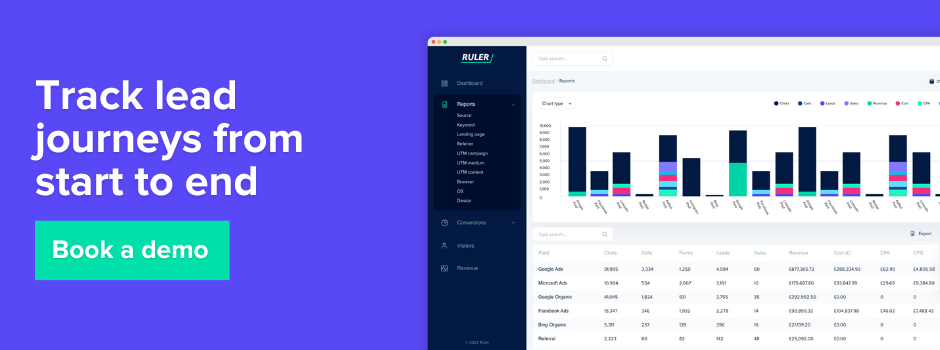From the first click to conversion. Track every touchpoint and see how marketing drives leads and converts them into revenue with these lead tracking tools.
Gone are the days of straightforward customer journeys – see an ad, convert, close.
Today’s buyers embark on a lengthy, winding path, conducting independent research, encountering numerous touchpoints, and taking their time before making a decision.
Further complicating matters, the ability to track these evolving customer journeys is becoming increasingly restricted.
The deprecation of third-party cookies and the ever-tightening grip of privacy regulations have made it a significant challenge for marketers to effectively track leads across diverse channels and conclusively demonstrate the impact of their campaigns.
In response to these challenges, a new wave of sophisticated lead tracking tools has emerged.
These tools go beyond the capabilities of basic analytics platforms like Google Analytics 4, offering marketers the insights they need to navigate the complexities of the modern customer journey.
And that’s exactly what we’re going to cover in this blog post.
Keep reading to learn:
💡 Pro Tip
Imagine knowing exactly which ads, campaigns, and keywords drive the most valuable leads. Well, Ruler makes it your reality. By tracking visitor-level data, Ruler tracks how visitors and leads interact with your brand across different channels like email, social media, and paid ads, allowing you to uncover a hidden map of your customer journey.
Skip to learn more about Ruler or book a demo to see how it tracks leads and attributes revenue to your marketing.
Understanding your customer journey is paramount.
Lead tracking tools offer a powerful solution, shedding light on every step potential customers take from initial contact to becoming paying clients.
These invaluable tools provide a comprehensive picture of lead behaviour, allowing you to optimise your sales and marketing strategies for maximum impact.
At their core, the very best lead tracking tools go beyond simple contact information.
They delve into the psyche of your leads, providing insights into their behaviour, preferences, and interactions across various touchpoints.
This includes website visits, ad clicks, email interactions, social media engagements, and much more.
Related: What is lead tracking and 11 tips to get started
Lead tracking tools are a must-have because they:
There are a few factors to consider before landing on a lead tracking tool to ensure that you make the right choice. This includes:
Transparent pricing with no hidden extras. Beyond the initial cost, be wary of hidden fees that could inflate expenses down the line. Look for transparent pricing models that clearly outline the features included in each package.
Online and offline lead tracking. In today’s omnichannel landscape, leads can originate from a myriad of sources—online and offline. Your lead tracking tool should gather data from various channels, including website form submissions, phone calls, and in-person events.
Integrations with other tools. Ideally, your tool should not operate in isolation but seamlessly integrate with other essential platforms within your business. By integrating with your CRM tool, marketing automation platforms, and other relevant software, your lead tracking tool can provide a complete view of the full lead cycle.
Lead tracking tools offer several benefits that can improve the quality of your marketing. From understanding how visitors interact with your marketing campaigns to tracking leads through their full customer journey. There are tons of tools which you can use to help identify and track your leads, and we’re going to explore a few favourites right here.
Tired of guessing which marketing channels generate real value? Ruler steps in as your secret weapon, transforming lead tracking into a powerful revenue attribution tool.
It isn’t just any ordinary lead tracking platform. Ruler goes beyond, connecting the dots between website visitors, their marketing touchpoints, and ultimately, the revenue they bring.
Ruler is a marketing attribution and measurement tool that allows you to connect leads directly to revenue. It identifies your website users and tracks their unique journey over multiple touchpoints.
Related: How to view full customer journeys in Ruler
When a visitor converts, Ruler seamlessly integrates with your CRM, marrying lead details with their marketing footprint.
Naturally, leads will move through the pipeline over several days, weeks or even months.
Ruler will continue to feed pipeline data into its reporting, so your marketing team can keep track of leads and determine whether they’re or not they’re adding enough quality to the later stages of the funnel.
When a lead is won, the revenue amount is sent back to the Ruler. It’s allocated to the touchpoints that influenced the sale or deal, allowing you to optimise your marketing based on value and not just leads.
Related: How Ruler attributes revenue to your marketing leads
Ruler can integrate with almost any marketing tool. This means you can view marketing sources, phone calls and revenue data in the tools you use every day, including Google Ads and Analytics.
Ruler Analytics pricing:
Pricing for Ruler starts at £199 a month and it has various plans to suit your specific needs. You can save 20% by paying annually and there are special rates for agency partners.
Ruler offers several features that can seamlessly track your leads and help you better understand your marketing ROI.
Ruler ratings:
💡 Pro Tip
Ruler goes beyond the limitations of traditional lead tracking. Unlike other tools that rely on clicks and identifiers, Ruler uses a smarter approach. It considers even unseen interactions, like ad views, to understand the full marketing influence on leads and sales. This provides a clearer picture of how your marketing efforts contribute, even when traditional tracking methods fall short.
Learn more about Ruler’s probabilistic tracking or book a demo to see it in action.
Act-On is a cloud-based marketing platform that goes beyond simple lead tracking. It shines in creating a unified customer journey.
You can connect your inbound marketing efforts (like social media and content marketing) with outbound campaigns (like email marketing) and lead nurturing programs. This provides a holistic view of how leads interact with your brand at every touchpoint.
Act-On’s true strength lies in its ability to leverage this data to build comprehensive customer personas.
These detailed profiles help you tailor marketing messages for maximum impact. You can use progressive profiling, lead scoring, and account-based marketing features to continuously refine your approach as you gather more customer insights.
With Act-On, you can visualise the entire customer journey across all channels, ensuring your marketing speaks directly to each prospect’s needs.
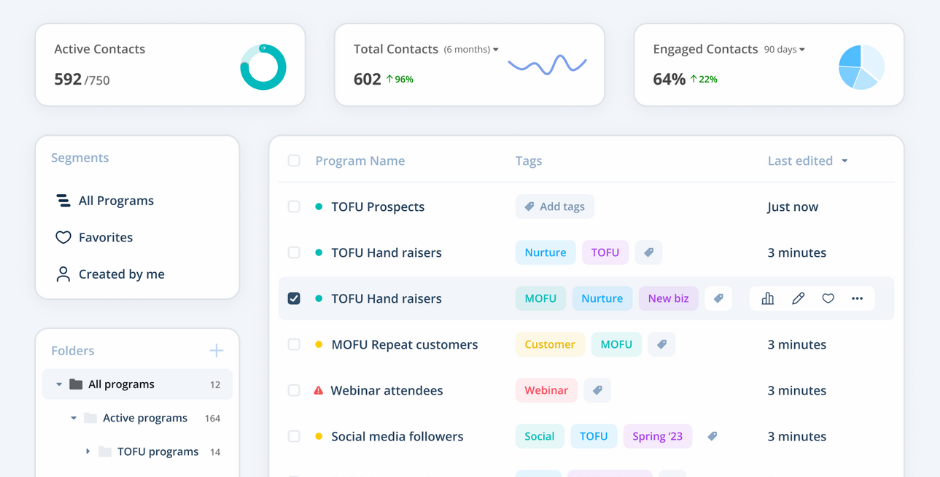
Act-on pricing:
Act-On’s pricing is based on the number of active contacts you engage with in a given month, rather than the total number of contacts in your database. This means you only pay for the contacts you’re actively marketing to. Act-On offers two main pricing plans: Professional and Enterprise starting from $900.
Act-on ratings:
If your focus is on high-value B2B leads, ActiveIQ is a powerful option.
This ABM/ABX software is designed to identify and nurture the accounts with the highest potential for closing deals. It uses intent data and smart scoring to pinpoint your most engaged accounts, allowing you to prioritise your marketing efforts effectively.
ActiveIQ goes beyond standard lead tracking by offering features like AdCONNNECT, a data-driven advertising technology specifically designed for B2B companies in industrial, manufacturing, and energy sectors.
This tool boasts impressive results, with reported conversion rates of 50% or higher and ROI exceeding conventional marketing campaigns by 10-30 times.
Additionally, ActiveIQ integrates seamlessly with other marketing and sales tools, eliminating data silos and creating a unified ecosystem for your team.
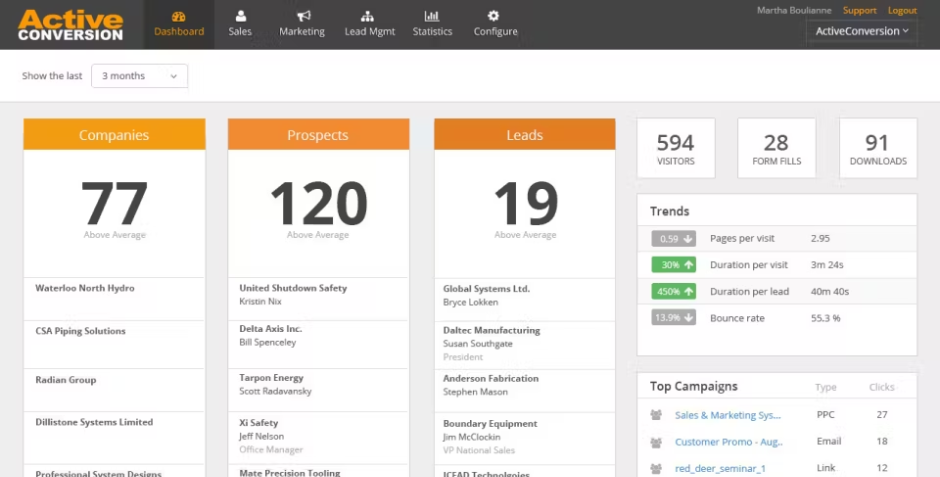
ActiveIQ pricing:
The ActiveIQ website does not list specific pricing information. To get detailed pricing, you need to request a demo or contact them directly through their website. You can find the “Request a Demo” and “Contact Us” options in their main navigation menu.
ActiveIQ ratings:
For businesses that rely heavily on phone leads, CallTrackingMetrics is a one to watch out for.
It goes beyond basic call tracking by providing clear attribution, allowing you to pinpoint exactly where your most valuable leads originate. This insight into your marketing efforts empowers you to optimise campaigns for maximum return on investment.
The beauty of CallTrackingMetrics is that it goes beyond just calls. Modern lead tracking requires a multi-channel approach.
This software allows you to manage lead and customer communication across various platforms, including texts, chats, and social media messages. Consolidating all your conversations into one place streamlines analysis and lead nurturing.
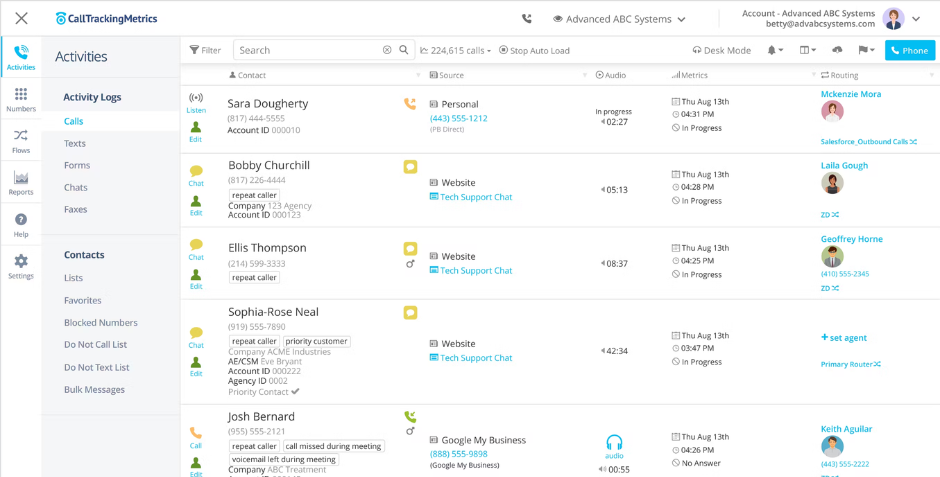
CallTrackingMetrics pricing:
CallTrackingMetrics offers several pricing plans:
Each plan includes different features tailored to various business needs, such as call tracking, conversation intelligence, lead management, sales performance, reporting, and developer tools. Usage fees for local numbers, minutes, and text messages apply additionally.
CallTrackingMetrics ratings:
It’s impossible to talk about lead tracking without mentioning Google Analytics, the OG in website analytics.
While not a dedicated lead tracking tool, Google Analytics provides a valuable starting point.
It offers a comprehensive overview of website performance, including tracking specific actions like form submissions, downloads, and thank you page visits as conversions, giving you a basic understanding of how many leads you’re generating and which pages might be driving them.
However, Google Analytics has limitations. Anonymised and aggregated data make it difficult to identify individual leads and connect them directly to revenue.
Additionally, with a maximum lookback window of 90 days, it’s not ideal for businesses with longer sales cycles. While a great starting point, Google Analytics should be used in conjunction with other tools for a more comprehensive picture.
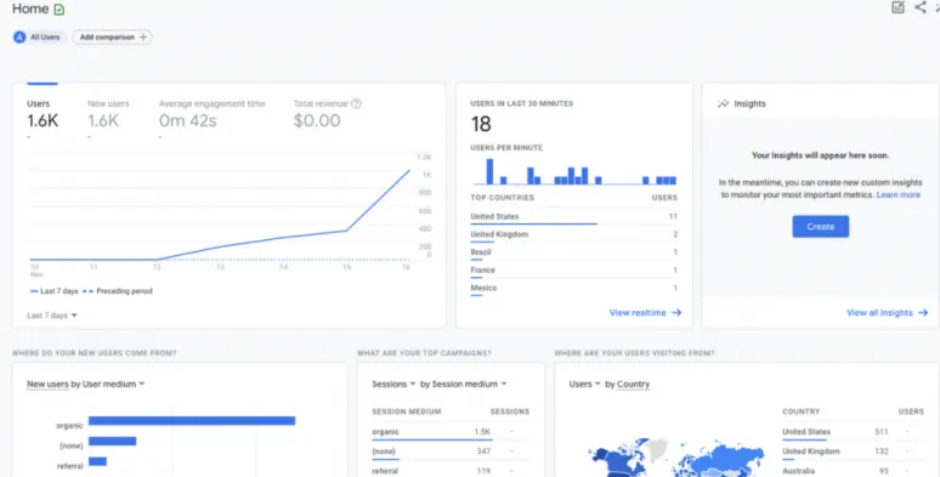
Google Analytics pricing:
Google Analytics offers a free version, suitable for small to medium businesses, with basic analytics tools. For larger enterprises, Google Analytics 360 is available as part of the Google Marketing Platform, starting at $150,000 per year. This version includes advanced features, integrations, and dedicated support.
Google Analytics ratings:
HubSpot’s Marketing Analytics & Dashboard software offers in-depth campaign analysis with built-in reporting and dashboards.
It goes beyond basic website data, providing granular Attribution Reporting for both Contact Attribution and Revenue Attribution.
Contact Attribution Reporting meticulously tracks every customer interaction and any revenue generated, ensuring credit goes to the appropriate marketing touchpoint, allowing you to optimise campaigns for maximum impact.
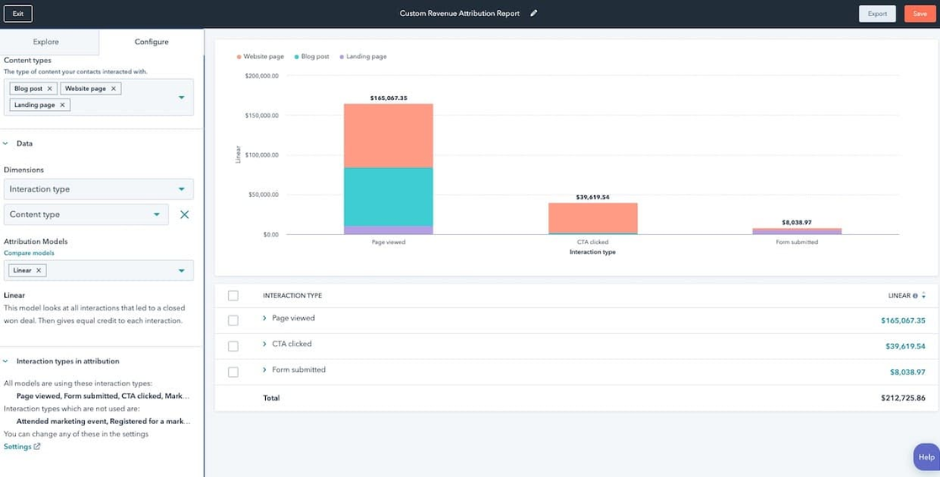
HubSpot pricing:
HubSpot’s revenue attribution feature is included in the Marketing Hub Enterprise package, which starts at around $3,000 per month and includes only 10,000 marketing contacts.
Google Analytics ratings:
The clue is in the name. Leadfeeder is a B2B lead generation and website visitor tracking tool.
It goes beyond basic analytics, identifying the companies visiting your site, even if they don’t submit a contact form. This empowers your marketing and sales in remarkable ways.
Leadfeeder uses IP address data and other tracking methods to reveal the organisations behind those website visits.
No more wondering “who’s there?” For each identified visitor, Leadfeeder provides a wealth of information.
You’ll gain insights into their industry, size, and even contact details, giving your sales team a roadmap to connect with the right people. This valuable lead data seamlessly integrates with popular CRM systems and marketing automation tools, eliminating data silos and ensuring it’s readily accessible within your existing workflows.
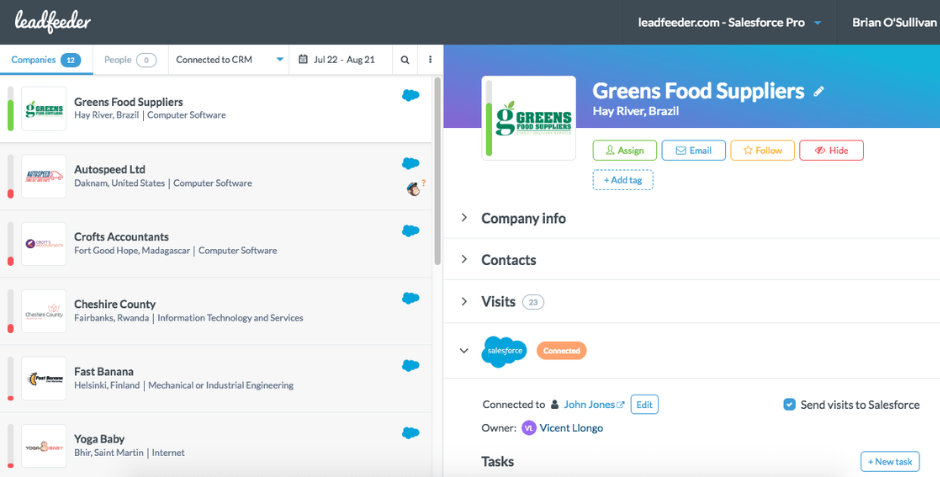
Leadfeeder pricing:
Leadfeeder has a free plan and paid plans. The free plan allows you to identify up to 100 companies per month and gives you access to data from the last 7 days only. Paid plans start at $99 per month and allow you to identify an unlimited number of companies. The price of your plan is based on how many companies you identify each month.
Leadfeeder ratings:
Whoisvisiting.com is another B2B website visitor tracking tool that sheds light on your anonymous website traffic.
It utilises IP tracking technology to identify the companies visiting your site, but its power goes beyond just names.
Whoisvisiting.com dives deeper, tracking visitor behaviour. You’ll see which pages they visit, how long they stay engaged, and how they interact with your website.
Equipped with detailed information like company name, industry, size, and location, you can target your lead generation efforts with laser precision.
Whoisvisiting.com empowers you to identify high-value prospects and prioritise your outreach. Even if visitors don’t submit a form, Whoisvisiting.com provides the intel your sales and marketing teams need to make informed outreach.
This valuable data bridges the gap and lets you connect with potential customers who might otherwise remain hidden.
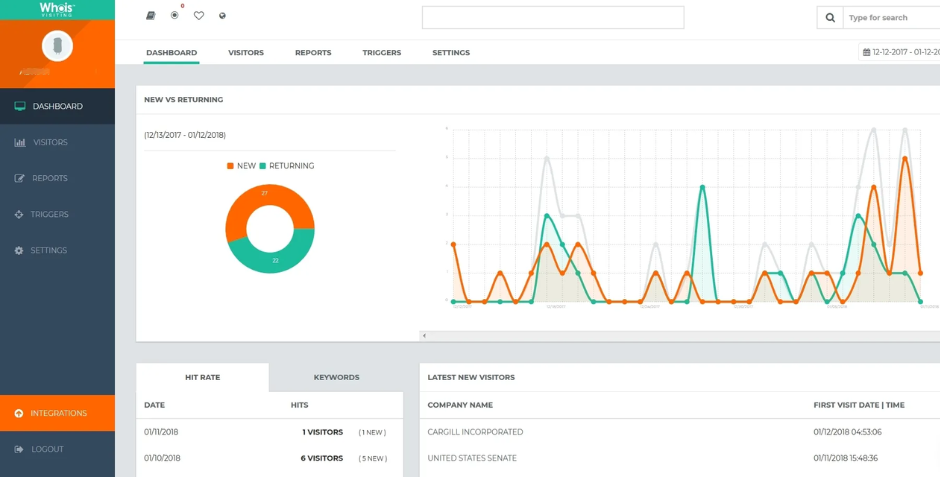
Whois pricing:
There are two pricing plans offered by Whois Visiting, a monthly plan and an annual plan. The monthly plan starts at $69 per month. The annual plan offers a 20% discount and starts at $745.20 per year. Both plans offer a 14-day free trial.
Whois ratings:
By incorporating these lead tracking tools into your marketing strategy, you can unlock a goldmine of website visitor data. You’ll gain a deeper understanding of your audience, identify high-potential leads, and ultimately drive conversions.#
Don’t forget, Ruler makes the process of tracking your leads easy.
It takes out the legwork by seamlessly attributing revenue to your marketing leads across multiple channels and touchpoints.
Want more info on Ruler? Download the guide on how Ruler works or book a demo and see it in action for yourself.
